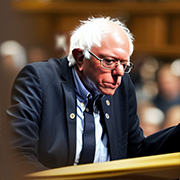(Thread IKs:
skooma512)
|
so will the depositors above $250k be bailed out yet again? Will the feds coerce a bigger bank to buy the corpse to insure everyone or just pull money from that weird emergency risk pool they set up
|
|
|
|

|
| # ? Jun 8, 2024 08:53 |
|
man thereís first republic atms and branches all over. crazy itís dead lol.
|
|
|
|
worst ever at ping-pong posted:so will the depositors above $250k be bailed out yet again? Will the feds coerce a bigger bank to buy the corpse to insure everyone or just pull money from that weird emergency risk pool they set up Hubbert posted:https://cdn.discordapp.com/attachments/863637224531820565/1085626443364581486/1678779131253.mp4
|
|
|
|
Iím confused, are we getting blood or a new thread title?
|
|
|
|
Xpforr posted:thread title
|
|
|
|
Smythe posted:man there’s first republic atms and branches all over. crazy it’s dead lol. gonna be saying this about us flags in 29 or 30 years inshallah
|
|
|
|
Smythe posted:man thereís first republic atms and branches all over. crazy itís dead lol. all first republic ATMs are now open to the public, bring a crowbar
|
|
|
|
itís wack how the govt bailed out and kept solvent the silicon vallley bank with like no branches but totally owned (scored a victory over) a large (?) retail bank
|
|
|
|
all WSB were convinced it was going to rocket earlier this week 
|
|
|
|
letting frc just get done like that letting interest rates pile up in the streets the fed getting nasty
|
|
|
|
Thorn Wishes Talon posted:i mean yes, the House is controlled by the GOP and they haven't been this loving unhinged in probably a century if not longer, so risk of a default is higher (it won't happen, though) If no one is taking your threats seriously anymore, why wouldn't you shoot a hostage? It's one default Micheal, what could it cost?
|
|
|
|
i hope they held
|
|
|
|
err posted:all WSB were convinced it was going to rocket earlier this week yea there was a huge wave of astroturf bots pushing that poo poo so loving hard in the run up to its quick demise honestly impressive how well it works
|
|
|
|
holde
|
|
|
|
lol some Samís Club put Diesel in the Gasoline holding tanks, whoopsie
|
|
|
|
Koirhor posted:lol some Samís Club put Diesel in the Gasoline holding tanks, whoopsie Modern fuel injected vehicles can run on either
|
|
|
|
so some giant banks just gave FRB $30B like a month ago and they are still failing? Do those giant banks lose their money? I hope so
|
|
|
|
Stereotype posted:so some giant banks just gave FRB $30B like a month ago and they are still failing? Do those giant banks lose their money? I hope so Isn't that what's meant by "contagion?"
|
|
|
|
I bet the reports that the FDIC are going to seize it are made up to tank the price
|
|
|
|
It might run a little rougher but a gasoline car built within the last five years or so can absolutely run off diesel.
|
|
|
|
Cool NIN Shirt posted:Modern fuel injected vehicles can run on either Thanks ChatGPT!
|
|
|
|
Stereotype posted:I bet the reports that the FDIC are going to seize it are made up to tank the price nah itís dead. the fair value of the bank (and thus stock) is much less than $0. Nobody will be excited to get it for cheap, unless itís with government guarantees / bailout cash.
|
|
|
|
1700 bank failures happen every year, grow up doomers
|
|
|
|
Cool NIN Shirt posted:It might run a little rougher but a gasoline car built within the last five years or so can absolutely run off diesel. The joke here is completely missing me. What?
|
|
|
|
Smythe posted:man there’s first republic atms and branches all over. crazy it’s dead lol. They were always trying to get me to refinance my student loans and now they're dead
|
|
|
|
Twerk from Home posted:The joke here is completely missing me. What? Yeah I don't think it's a joke they're just idiots lmao. If you put a tank of diesel in a gasoline car you will gently caress it up pretty much immediately regardless if new or not
|
|
|
|
1700 banks + 300 bananas = 2000 research points towards a banana republic
|
|
|
|
Brogeoisie posted:Yeah I don't think it's a joke they're just idiots lmao. If you put a tank of diesel in a gasoline car you will gently caress it up pretty much immediately regardless if new or not Yeah they might be thinking of 15% ethanol gasoline.
|
|
|
|
coelomate posted:nah itís dead. the fair value of the bank (and thus stock) is much less than $0. Nobody will be excited to get it for cheap, unless itís with government guarantees / bailout cash. I don't fully understand how a bank run makes their value less than $0. Don't they own a ton of loans? Deposits are liabilities for banks, not assets, and they were fully capable of paying out the $100B in frightened rich people money that was pulled out recently.
|
|
|
|
Stereotype posted:I don't fully understand how a bank run makes their value less than $0. Don't they own a ton of loans? Deposits are liabilities for banks, not assets, and they were fully capable of paying out the $100B in frightened rich people money that was pulled out recently. Yeah so you buy a piece of paper for ten and after 10 years it pays out 11. But oh no the new 10 dollar paper now would pay out 12. Hope you don't have to sell because it's going to get you less than the 10 you put in.
|
|
|
|
HallelujahLee posted:1700 banks + 300 bananas = 2000 research points towards a banana republic 1400 billion + 600 billion = insolvency
|
|
|
|
Smythe posted:man thereís first republic atms and branches all over. crazy itís dead lol. Oh dear.. this will probably generate a bunch of "ATM is not coming online" calls if they don't warn the bank branches properly first....
|
|
|
|
genericnick posted:Yeah so you buy a piece of paper for ten and after 10 years it pays out 11. But oh no the new 10 dollar paper now would pay out 12. Hope you don't have to sell because it's going to get you less than the 10 you put in. according to the earnings report that everyone is freaking out about they have double the cash / liquid cash equivalents than they have uninsured deposits. normal people with checking accounts also aren't doing the bank run, it's just rich people whose money isn't FDIC insured, though maybe now that will change since they are in the news. They don't actually have a crazy about of old treasuries according to this thing
|
|
|
|
Are you connected? The fed is gonna make you whole. If you're not? Get hosed you chud loser.
|
|
|
|
Stereotype posted:I don't fully understand how a bank run makes their value less than $0. Don't they own a ton of loans? Deposits are liabilities for banks, not assets, and they were fully capable of paying out the $100B in frightened rich people money that was pulled out recently. The value of their assets (low interest rate mortgages, bonds, and other securities) tanked. Loans paying 2% interest are borderline worthless now because you can go to the government and get 4.5% at will, risk-free. So when people went to the bank en masse to call on those liabilities (the deposits) the bank's balance sheet got clobbered.
|
|
|
|
Stereotype posted:according to the earnings report that everyone is freaking out about they have double the cash / liquid cash equivalents than they have uninsured deposits. normal people with checking accounts also aren't doing the bank run, it's just rich people whose money isn't FDIC insured, though maybe now that will change since they are in the news. They don't actually have a crazy about of old treasuries according to this thing Matt Levine had a plausible sounding explanation: quote:But First Republic reported a profit. The problem, for First Republic, is that lots of its low-interest deposits have fled, and it has had to replace their funding by borrowing from the Fed, the FHLB and the big banks at much higher rates. Meanwhile it still has lots of long-term loans made at low interest rates. If you borrow short at 0% to lend long at 3%, and then your short-term borrowing costs go up to 5% while your loans stay the same, you will be losing 2% a year on your loans, and that is roughly the state that First Republic finds itself in. But it is not exactly the state that First Republic finds itself in: It still has some cheap insured deposits, some short-term assets, some floating-rate assets, some fee income, and in fact it has managed to scrape out a profit even as rates have moved against it. Can that last? I mean, maybe not:
|
|
|
|
Vox Nihili posted:The value of their assets (low interest rate mortgages, bonds, and other securities) tanked. Loans paying 2% interest are borderline worthless now because you can go to the government and get 4.5% at will, risk-free. So when people went to the bank en masse to call on those liabilities (the deposits) the bank's balance sheet got clobbered. but like "bank can't print tons of money  " isn't the same as "bank failed." does the FDIC step in just because the bank put themselves in a stupid unprofitable spot? I thought what triggered it was "bank literally doesn't have any more money on hand." But maybe they really don't have any more money I guess. " isn't the same as "bank failed." does the FDIC step in just because the bank put themselves in a stupid unprofitable spot? I thought what triggered it was "bank literally doesn't have any more money on hand." But maybe they really don't have any more money I guess.I bought 3 shares at $2 anyway because it seems like a fun bet on a stock that was worth $200 two years ago
|
|
|
|
Stereotype posted:but like "bank can't print tons of money There are a lot of regulatory requirements for a bank to get access to the emergency funding and discount windows and etc. that FRC is using to stay alive. Their financials are trash so the feds might yeet them out of existence by pulling away that life line, which is... kinda weird, admitedly. As usual Matt Levine has the details if you have the time to read it: quote:First Republic
|
|
|
|
FRB also owes the fed and the combined liabilities come to a bit under their assets. The worry is that if more deposits leave, they have to ditch some assets for cash to meet regulatory requirements, then the loans and such that are worth less on the market than their paper value get sold and that loss is realized. There's some other accounting rules that go on like, selling loans that were marked HTM means they have to categorize more of their assets as AFS or HFT rather than HTM, so they suddenly have to realize all those losses and that makes it even worse for them. If the bank looks like it won't meet its requirements then the FDIC is gonna step in. They don't want to, they'd much rather another bank buy them and assume the liabilities or they'd rather have banks come together to help rescue them. That last bit already happened for FRB last week and the banks don't want to do that again - they're already the majority of the uninsured deposits at FRB. So then it comes down to whether FDIC thinks the bank can turn it around or not, and it sounds like they think nothing more can be done.
|
|
|
|

|
| # ? Jun 8, 2024 08:53 |
|
Vox Nihili posted:The value of their assets (low interest rate mortgages, bonds, and other securities) tanked. Loans paying 2% interest are borderline worthless now because you can go to the government and get 4.5% at will, risk-free. So when people went to the bank en masse to call on those liabilities (the deposits) the bank's balance sheet got clobbered. is this true? did no economist notice this?
|
|
|


































